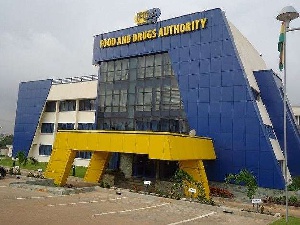- Home - News
- TWI News | TV
- Polls
- Year In Review
- News Archive
- Crime & Punishment
- Politics
- Regional
- Editorial
- Health
- Ghanaians Abroad
- Tabloid
- Africa
- Religion
- Election 2020
- Coronavirus
- News Videos | TV
- Photo Archives
- News Headlines
- Press Release
General News of Wednesday, 23 August 2017
Source: Ghanaian Chronicle
Feature: FDA must be proactive
Last week, there were reports of the death of five people in the Kpando Municipality of the Volta Region, who allegedly died after consuming a fish called puffer fish.
Twenty-six other persons were also reportedly admitted at the hospital after eating the 'poisonous' fish, known locally as gede.
Consequently, the Kpando Municipal Assembly has banned the sale of the puffer fish on the market, after the Kpando Municipal Public Health Emergency Committee established that the cases were associated with the consumption of the poisonous fish.
The Chronicle is stunned by the revelation, and the fact that the Food and Drugs Authority (FDA) could not foresee that the consumption of the puffer fish could result in the deaths of sections of the Ghanaian public.
We are calling on the FDA to be proactive and ensure that they are able to see danger from miles away. This will go a long way to protect the good people of this country from falling prey to such occurrences in future.
Interestingly, even though the Kpando Municipal Assembly is aware that the fish is poisonous, the FDA, whose responsibility it is to protect Ghanaians from consuming unwholesome foods, had no inkling about the venomous nature of the puffer fish.
The Assembly was blunt when it issued a statement that; “This fish is well known by the locals and the danger it poses when not handled properly before consumption. But they continue to catch and sell it to the public.”
What The Chronicle cannot fathom is why the FDA always waits and allows unwholesome food to enter or flood the Ghanaian market before it jumps into action, by which time many people have either died or been admitted at hospital.
On February 25, this year, Prof Kwabena Frimpong-Boateng, Minister for Environment, Science, Technology and Innovation (MESTI), blew the whistle on the use of formalin to preserve food items, particularly Koobi (Salted Tilapia).
Prof Frimpong Boateng then appealed to traders to stop using formalin, a chemical which is usually used to embalm corpses, to preserve food items, since it was dangerous to human health.
It was after the Minister for MESTI had blown the whistle over the use of formalin that the FDA woke up from its slumber to go into the matter.
Furthermore, a couple of months ago, a video started making rounds on social media, which suggested that someone had used the label of Blue Jeans, an energy drink being sold on the Ghanaian market, to cover an existing product to deceive its customers.
The video in question showed that the product had been re-labelled as Blue Jeans Energy Drink, when, in actual fact, it was entirely a different product.
The FDA issued a statement saying; “We acknowledge with deep concerns the potential safety issues this video raises and the apparent panic it has caused.”
The statement continued: “The FDA regrets that the consuming public has had to grapple with this challenge, and wishes to assure the public that it has taken immediate steps to address the concerns.”
The Chronicle thinks that the time has come for the FDA to be up and doing to revive the confidence the Ghanaian populace has in it, as the situation now is one that leaves much to be desired.
The FDA must also bear in the mind that criminals of today operate in a very cunning and subtle manner, and, therefore, it must (FDA) try to be ahead of them, else, they will overtake the Authority.
Ghanaians want to have absolute self-assurance in the people who have been mandated to protect them from coming into contact with poisonous and unwholesome foods, which would affect their health.











